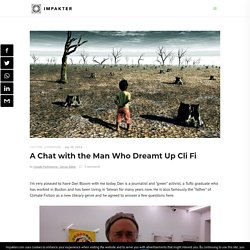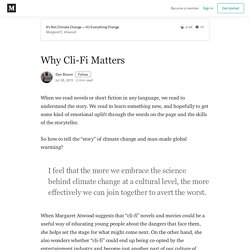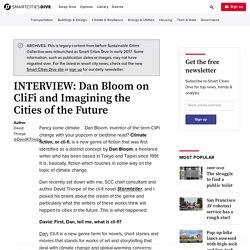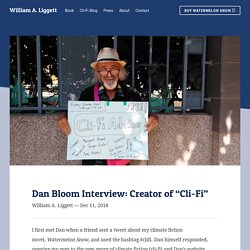

Cli-Fi: A New Genre Takes Flight. When I posted a small blog on Goodreads about an online site recommending books for their 2014 Cli-Fi summer reading list, I didn’t anticipate the reaction I would get.

Instantly, I received emails from all over the world and an invitation to join a climate fiction group on Facebook. Just what is this term, and why are folks so passionate about it? One of the emails I received was from Dan Bloom, a journalist who lives in Taiwan. Bloom was the first to come up with this catchy literary label. After time spent in France, Italy, and Japan, he spent 12 years in Alaska along the winter coasts of Nome, where many of his ideas for the Cli-Fi genre came to him. So here is my brief interview with Mr. Tara Masih: I consider myself very lucky to have gotten to know two writers who have coined popular contemporary genre terms: James Thomas for Flash Fiction, and now Dan Bloom for Cli-Fi.
TM: What makes you so passionate about this type of literature? About. A Chat with the Man Who Dreamt Up Cli Fi - Impakter. I’m very pleased to have Dan Bloom with me today.

Dan is a journalist and “green” activist, a Tufts graduate who has worked in Boston and has been living in Taiwan for many years now. He is also famously the “father” of Climate Fiction as a new literary genre and he agreed to answer a few questions here. Claude: Dan, you’re the person who coined the term Climate Fiction, cli-fi for short, back in 2008. When did the term start to catch on? Claude: I took a look at that article, it has a great title “So Hot Right Now: Has Climate Change Created a New Literary genre?” Why Cli-Fi Matters - Dan Bloom - Medium. When we read novels or short fiction in any language, we read to understand the story.

We read to learn something new, and hopefully to get some kind of emotional uplift through the words on the page and the skills of the storyteller. So how to tell the “story” of climate change and man-made global warming? I feel that the more we embrace the science behind climate change at a cultural level, the more effectively we can join together to avert the worst. When Margaret Atwood suggests that “cli-fi” novels and movies could be a useful way of educating young people about the dangers that face them, she helps set the stage for what might come next. On the other hand, she also wonders whether “cli-fi” could end up being co-opted by the entertainment industry and become just another part of our culture of distraction and cute cat videos. I hope “cli-fi” remains true to its intentions. This is where cli-fi comes in. That’s the potential of cli-fi. Books matter. INTERVIEW: Dan Bloom on CliFi and Imagining the Cities of the Future.
Fancy some climate change with your popcorn or bedtime read?

Climate fiction, or cli-fi, is a new genre of fiction that was first identified as a distinct concept by Dan Bloom, a freelance writer who has been based in Tokyo and Taipei since 1991. It is, basically, fiction which touches in some way on the topic of climate change. Dan recently sat down with me, SCC chief consultant and author David Thorpe of the cli-fi novel Stormteller, and I picked his brains about the cream of the genre and particularly what the writers of these works think will happen to cities in the future. Dan Bloom Interview: Creator of “Cli-Fi” - William A. Liggett. William A.

Liggett — Dec 11, 2018 I first met Dan when a friend sent a tweet about my climate fiction novel, Watermelon Snow, and used the hashtag #clifi. Dan himself responded, opening my eyes to the new genre of climate fiction (cli-fi) and Dan’s website cli-fi.net. Soon I began seeing references to cli-fi in articles about fiction writing, education, and popular books. Dan actively supports authors in this genre, new and veterans alike. He generously agreed to an interview about how “cli-fi” came to be and the impact it has had. What led to your interest in climate fiction?
I had been following the news about the IPCC report in 2006 in newspapers in the UK and the USA online since that time. In January 2007, I became very depressed, psychologically depressed, blue, over what I had been reading and digesting about that IPCC report, the first of several that would be published over the next ten years. What inspired you to come up with the term “cli-fi”? No. I am not optimistic at all.